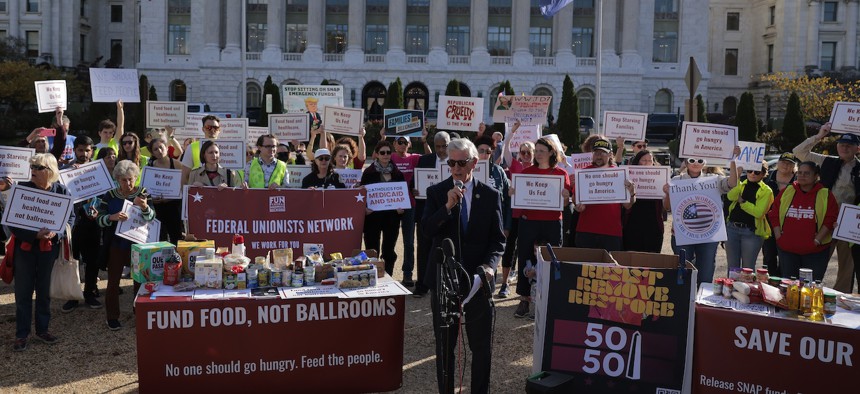
Rep. Don Beyer, D-Va., speaks during a rally with faith leaders, food bank workers, and furloughed federal employees in front of the Agriculture Department on the National Mall in Washington, D.C., during the 30th day of the federal government shutdown on October 30, 2025. Chip Somodevilla/Getty Images
Employees are receiving renewed furlough notices as shutdown enters second month, this time without back pay guarantees
The shutdown is heading into November, sparking new, altered furlough notices to 650,000 employees.
The government shutdown is poised to enter its second month on Saturday, meaning agencies across government on Friday once again sent furlough notices to hundreds of thousands of workers.
To maintain clarity between shutdown furloughs and more permanent and planned cost-saving measures, notices are required to go out every 30 days. The current funding lapse entered its 31st day on Friday—and could next week surpass the record-setting, 35-day impasse from 2018-2019—which required a fresh, formal update from agencies letting around 650,000 employees know they should remain at home without working.
The new notices largely included the same boilerplate language as the originals that went out at the outset of the shutdown, those from several agencies viewed by Government Executive showed, with one notable difference: they no longer contained language assuring employees that back pay was guaranteed when the shutdown concluded.
“The Government Employee Fair Treatment Act of 2019 provides that employees shall be paid for the period of the lapse in appropriations ends,” read a General Services Administration furlough notice sent on Oct. 1.
“As soon as possible after the appropriations lapse ends, you will be paid for the period of the lapse in appropriations, in accordance with 31 U.S.C. § 1341(c) and other applicable laws,” read another from the Interior Department.
In both cases, and all others reviewed by Government Executive, that language was removed.
The change was expected, as the Trump administration has, mostly, argued in recent weeks that it has no obligation to grant retroactive compensation to employees, despite President Trump in 2019 signing into law a measure that guaranteed it in all future shutdowns.
The Internal Revenue Service delayed its furloughs by a week at the shutdown’s outset, but eventually sent messages to employees noting back pay was guaranteed. The following day, it sent a new message that its previous email contained incorrect information. It deleted the original email from all employees’ inboxes.
Shortly after the shutdown began, as Government Executive first reported, the Office of Management and Budget deleted from its guidance any reference to the 2019 law or back pay for furloughed federal workers. OMB subsequently released new legal guidance suggesting Congress must take legislative action to authorize back pay.
Both Democrats and Republicans in Congress rejected the Trump administration's newly minted legal argument, saying the matter was settled and the workers were guaranteed retroactive pay. Legal experts said the plain reading of the law and its legislative history made clear Congress intended to ensure back pay for those furloughed in all future shutdowns, and the Trump administration’s own guidance on the law in 2019 stated it applied in perpetuity.
In federal court this week in a case regarding layoffs, a Justice Department attorney also contradicted the White House’s new argument.
“We're dealing with a class of employees who are furloughed, who are not working on specific government actions,” said Michael Velchik, the Justice lawyer. “They're incurring future obligations to the federal taxpayer, who will then have to pay back pay wages for these individuals who are not working.”
The total the government would have to pay employees for not working could reach unprecedented heights next week. The Senate adjourned on Thursday and is not set to reconvene until Monday evening, when no vote to reopen government is scheduled. The House remains on recess indefinitely after Speaker Mike Johnson, R-La., canceled votes for the seventh consecutive week next week.
Senate Democrats have not backed down from their demand that any bill to reopen government address premium hikes scheduled to take effect in January for Americans who receive health insurance through the Affordable Care Act. Democrats have also sought assurances that Trump cannot unilaterally claw back money that Congress authorizes. Republicans have remained steadfast they will only negotiate over those issues once the shutdown ends.
The impacts of the shutdown continue to compound. Tens of millions of Americans are slated to lose their Supplemental Nutrition Assistance Program (SNAP) benefits on Nov. 1. Major airports across the country have also issued delays due to staffing issues, as absenteeism among air traffic controllers who are working without pay continues to rise. Hundreds of thousands of employees who are currently “excepted” during the shutdown because their jobs are necessary to protect life or property missed full paychecks within the last week.
President Trump this week called for the end of the 60-vote filibuster threshold to end the shutdown, but most congressional Republicans, including Senate Majority Leader John Thune, R-S.D., have said they have no interest in doing so.
Some lawmakers have noted encouraging, bipartisan talks on full-year appropriations bills, but a clear path out of the shutdown has yet to emerge.
Share your experience with us: Eric Katz: ekatz@govexec.com, Signal: erickatz.28
NEXT STORY: What federal employees need to know about Medicare enrollment







